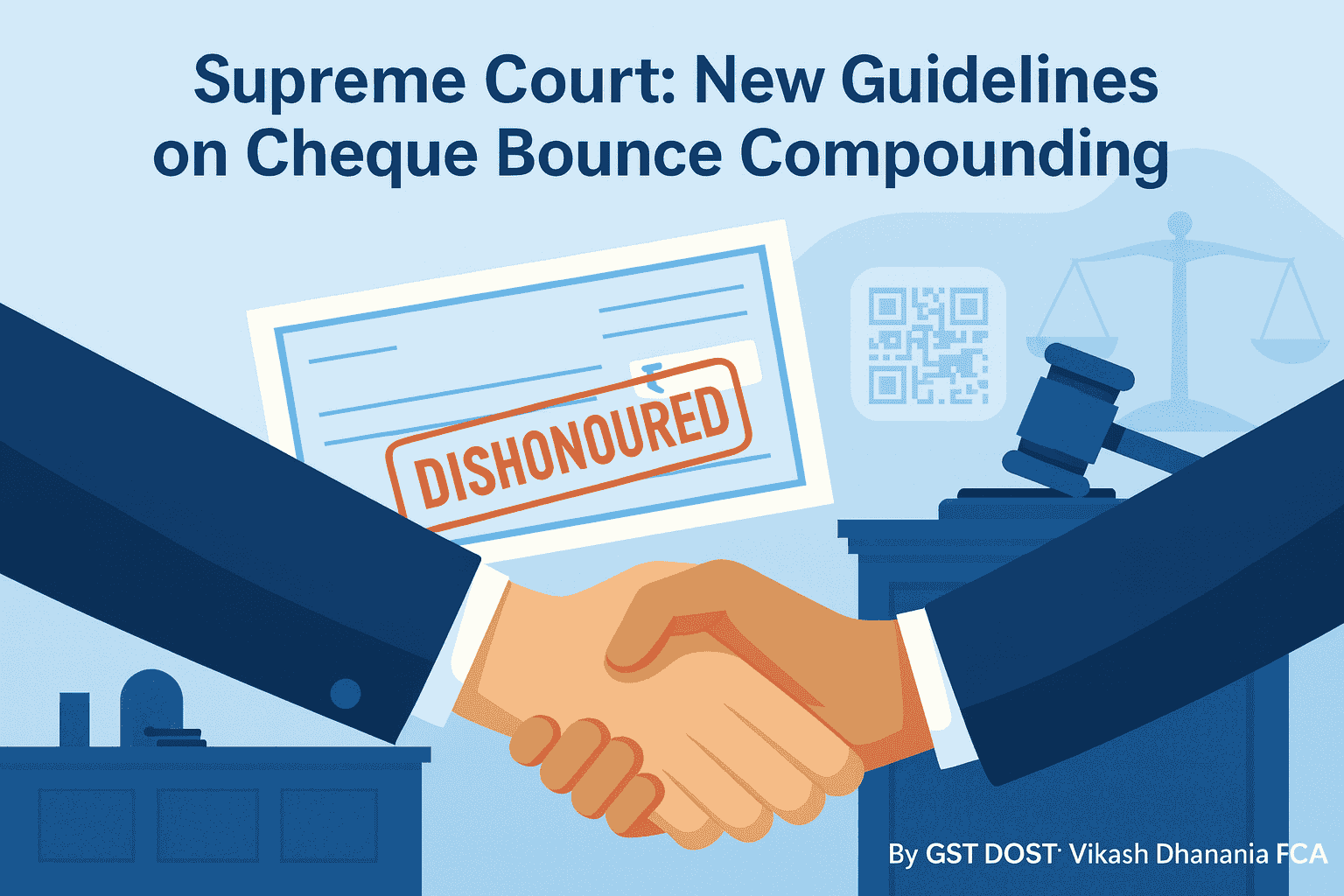Cheque Dishonour cases arising under Section 138 of the Negotiable Instruments Act, 1881, have long been a significant burden on the Indian judicial system. These cases, while criminal in nature, primarily focus on enforcing payment obligations and restoring trust in cheques as a dependable method for conducting business transactions. In light of this, the Honourable Supreme Court of India, in the case of Sanjabij Tari v. Kishore S. Borcar [2025 INSC 1158], has introduced key directives aimed at simplifying and expediting the compounding of such cases.
Why Compounding Matters
Section 138 cases are categorised as "quasi-criminal" in nature. Their primary objective is not to impose penalties, but rather to facilitate the repayment of funds and uphold trust in financial transactions. The process of compounding allows parties to reach amicable resolutions, thus avoiding protracted trials and alleviating the significant backlog in the judicial system.
According to data referenced by the Court, cheque bounce cases account for nearly 50% of all trial court pendency in major cities such as Delhi and Mumbai.
Background of the Case
The appeal originated from conflicting judicial decisions: the Trial Court and the Sessions Court had convicted the accused for dishonour of a cheque, whereas the Honourable High Court had acquitted him. The Honourable Supreme Court restored the lower courts' findings and, notably, took the opportunity to reassess its previous framework regarding the compounding of such cases.
The New Compounding Framework
In the case of Damodar S. Prabhu vs. Sayed Babalal H., [(2010) 5 SCC 663], the Honourable Court previously established a graded cost system for late-stage settlements, with fees ranging from 10% to 20% of the cheque amount, depending on the level of Court involved.
In light of decreasing interest rates and the increasing need for timely settlements, the Court has recently amended these guidelines to facilitate more accessible resolution processes:
- Before Defence Evidence: If an accused party settles the cheque amount before recording their evidence, the case may be compounded without any additional costs.
- Before Trial Judgment: If the payment is made after the defence evidence has been presented but before the judgment, compounding is permitted with an additional payment of 5% to the Legal Services Authority.
- In Appeal/Revisional Stage: At the Sessions Court or High Court level, the accused may settle by paying an additional 7.5%.
- Before the Supreme Court: Any settlement occurring before the Apex Court requires an additional payment of 10%.
This revised scheme, designed to expedite dispute resolution, is particularly beneficial for businesses, as it reduces the risk of significant penalties associated with delayed settlements.
_1759078546.png)
Practical Directions for Faster Disposal:
The Court has implemented several structural measures to enhance efficiency and accessibility, ensuring a more streamlined judicial process.
The Court has implemented several structural measures to enhance efficiency and accessibility:
- Electronic Summons: Service of summons can now be conducted through email, WhatsApp, or other messaging applications, thereby expediting the process.
- Online Payment Options: Courts are required to establish QR codes and UPI links to facilitate prompt payment of cheque amounts at the initial stage of proceedings.
- Case Synopsis Format: Every complaint submitted must include a standardised one-page summary, which will aid in effective tracking and management.
- Court Dashboards: High-pendency courts, such as those in Delhi, Mumbai, and Kolkata, are mandated to maintain dashboards to monitor and track disposal rates.
These measures aim to streamline judicial processes and improve overall case management within the court system.
Why This Matters for Businesses
For businesses, these guidelines translate into reduced time spent on litigation, expedited recoveries, and minimised uncertainty. By fostering early settlement, the law effectively promotes financial discipline and enhances the overall ease of conducting business. This relief from prolonged legal proceedings can provide a sense of reassurance and confidence in the legal system.
Conclusion
The Honourable Supreme Court has emphasised its commitment to expediting cheque dishonour cases to prevent prolonged disputes. This initiative aims to enhance timely payments, foster trust among parties, and alleviate the burden on the judicial system. Both businesses and individuals can benefit significantly from these reforms by adopting proactive measures.
At GST DOST, our primary focus is on providing exceptional GST compliance services. However, we go beyond this by offering updates and insights on relevant issues outside of GST because we genuinely care about your business's overall well-being. We understand that staying informed about the broader legal landscape is crucial for your success. Our commitment is to ensure that you not only easily navigate GST requirements but also remain aware of key developments that may impact your business. With GST DOST, you gain a trusted partner dedicated to providing peace of mind, enabling you to grow your business confidently.




